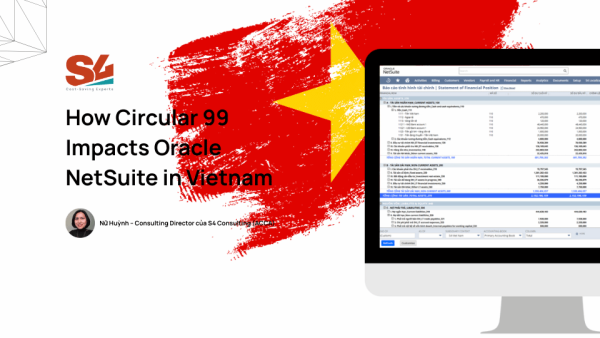
Why Your Internal Team Matters More Than the Vendor in an Oracle NetSuite Project
Author: Pham Hoang Lac – CTO, S4 Consulting
In many ERP projects, business leaders often believe that success depends entirely on the software vendor or the system integrator. They assume that by choosing the right Oracle NetSuite Partner in Vietnam, the project will succeed. But in reality, the true deciding factor is the strength of the internal team. No matter how skilled the vendor may be, without a capable internal team to take ownership, the project is unlikely to deliver sustainable results.
Ownership Over Outsourcing
The biggest differentiator of Oracle NetSuite compared to local ERP/accounting systems like Fast, Bravo, or Misa lies in its SuiteCloud Platform. This platform comes with no-code/low-code tools, a robust API framework, and SuiteScript, allowing businesses to extend, customize, and integrate NetSuite with other applications flexibly. While local solutions are often limited and require vendor intervention for any change, NetSuite empowers companies to develop reports, design workflows, add functionalities, or connect to other applications without heavy vendor dependency. This platform capability is where NetSuite creates long-term value—giving companies flexibility, lowering operating costs, and ensuring true system ownership.
Project Mindset vs. Operations Mindset
A common mistake in ERP projects is putting people with an operations mindset in charge—those who focus on keeping things stable, avoiding risks, and preserving the status quo. But implementing Oracle NetSuite is not business as usual; it’s a transformation project. It requires a project mindset: the willingness to experiment, accept controlled risks, make timely decisions, and pursue long-term value. “Project Mindset Guys” are those who see the big picture, prioritize strategic benefits, and are willing to abandon outdated processes to build something new. On the other hand, if the project is dominated by “Operations Mindset Guys,” decisions become slow, risk-averse, and the ERP ends up mirroring old processes instead of driving breakthrough improvements.
Don’t Forget to Leverage AI in Operations
AI is fundamentally changing the way businesses implement and operate ERP. Tools like ChatGPT, GitHub Copilot, and Notta are making it easier for internal teams to learn, program, and master Oracle NetSuite. Companies can now create scripts, build reports, and automate workflows without fully relying on vendors. A strong Oracle NetSuite Partner in Vietnam is not only expected to implement the system but also to transfer knowledge on how to apply AI—using AI to accelerate coding, testing, training, and operations. This knowledge transfer ensures long-term savings, higher productivity, and genuine ownership of the system. For more, see Advice for Businesses Seeking Oracle NetSuite Implementation Partners in Vietnam.
Critical Internal Roles You Cannot Skip
| Role | Key Responsibilities |
|---|---|
| Project Sponsor | Provides executive sponsorship, approves budgets, sets strategic direction, and resolves conflicts. |
| Project Manager (PM) | Represents the business, coordinates the project, tracks progress, liaises with the vendor, and reports to the Sponsor. |
| Business Process Owners (BPOs) | Define business requirements, approve process design, and make functional decisions. |
| Key Users | Join workshops, support UAT, train end users, and provide feedback on usability. |
| End Users | Use the system daily, attend training, and adapt to new processes. |
Effort Contribution by Project Phase
| Role | Initiation | Discover | Design & Configure | Testing | Post-Go-Live |
|---|---|---|---|---|---|
| Project Sponsor | 20% | 15% | 10% | 10% | 10% |
| Project Manager | 40% | 50% | 60% | 70% | 50% |
| BPOs | 30% | 60% | 50% | 40% | 30% |
| Key Users | 10% | 40% | 60% | 80% | 50% |
| End Users | 0% | 10% | 20% | 50% | 80% |
Insights: The PM role is critical throughout the entire project. BPOs and Key Users are most engaged during Discover and Design phases. End Users play a vital role during Testing and Post-Go-Live. Sponsors invest less time but provide critical strategic guidance.
The Reality in Vietnamese Companies
A major weakness in Vietnamese companies is the lack of a strong ERP Manager. As a result:
- Departments tend to overload RFPs with every possible requirement to avoid blame, especially when it comes to reports.
- Many standard NetSuite reports (already covering 60–70% of needs) are ignored, while companies request costly custom reports that mimic their old formats.
- RFPs turn into bureaucratic documents rather than tools for selecting the right solution.
An experienced ERP Manager—or a knowledgeable Oracle NetSuite Partner in Vietnam—helps companies separate must-haves from nice-to-haves, focusing on true business value instead of paperwork.
Questions Every Executive Should Ask
- Are we letting the vendor make key decisions for us?
- Are we prioritizing cultural fit, or just impressive resumes?
- Are contractors fully dedicated to us, or split across multiple clients?
- Are we falling into the “unicorn trap” of expecting one person to do it all?
- Do we have enough internal leadership in PM, Change Management, and Process Ownership?
Conclusion
Vendors and consultants bring technical expertise, but your internal team decides success or failure. They are the ones who will live with Oracle NetSuite every day, long after consultants leave. Building a strong, empowered, and well-structured internal team transforms ERP from a cost burden into a strategic enabler.






